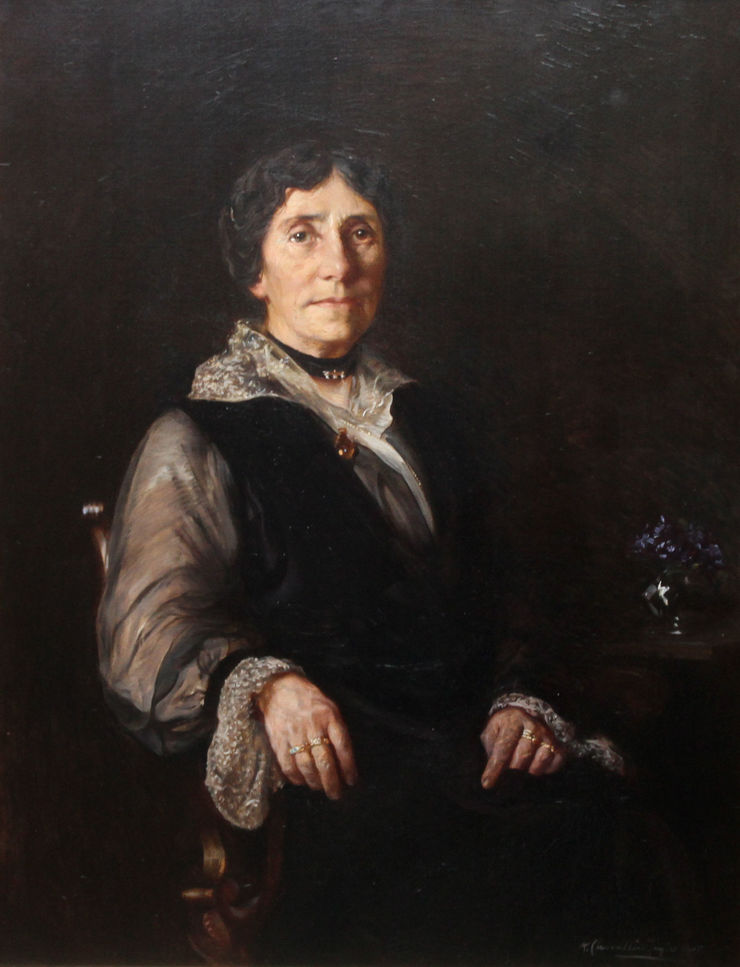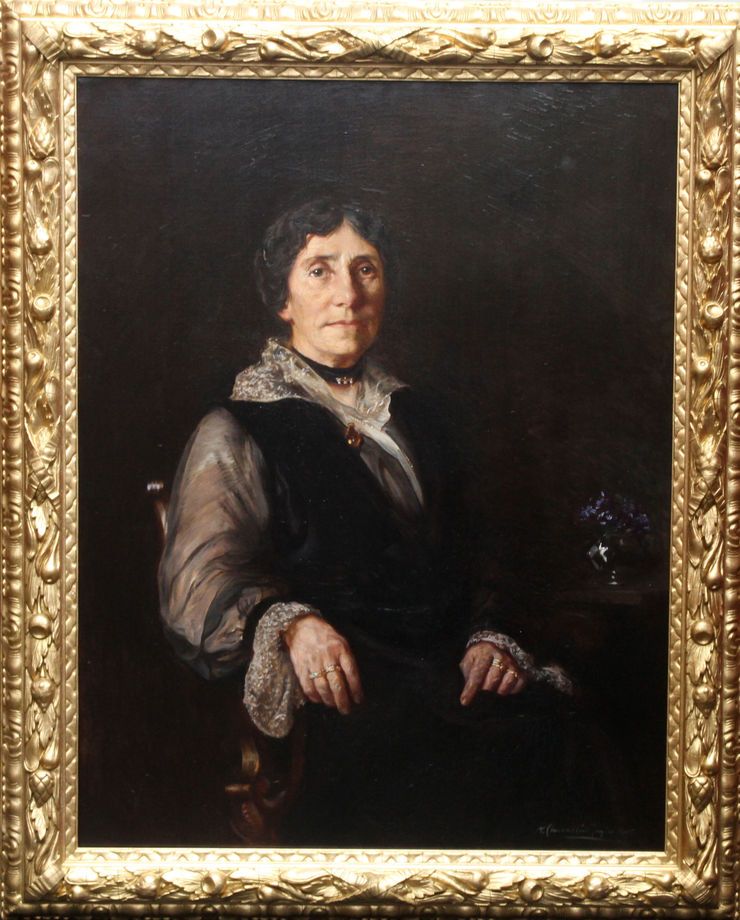Albert Chevallier Tayler (1862-1925)
| Artist Name | Albert Chevallier Tayler (1862-1925) |
|---|---|
| Title | Portrait of a Lady in a Lace Trimmed Gown |
| Description | This stunning large portrait oil painting is by noted British artist Albert Chevallier Tayler. The painting was painted in 1915 and has the clear influences of his 12 years with the Newlyn School art colony in Cornwall and his favoured flat brush technique. The half length portrait is of a seated lady wearing a lace trimmed gown. Typical of the style it is dark and atmospheric, the main focus being on her face. This painting could easily be in the Penlee Gallery in Penzance, Cornwall. Signed and dated 1915. |
| Provenance | Bedfordshire estate. |
| Medium | Oil on Canvas |
| Size | 33 x 43 inches |
| Frame | Housed in a beautiful gilt gesso frame, 53 inches by 43 inches and in good condition. |
| Condition | Excellent condition. |
| Biography | Albert Chevallier Tayler (1862–1925) was an English artist who specialised in portrait and genre painting, but was also involved in the plein air methods of the Newlyn School. He studied at Heatherley's School of Art, Royal Academy Schools and with avant-garde painters in Paris. He was educated at Bloxham School in Oxfordshire and won a scholarship to study at the Slade in 1879. He is most known for his twelve-year involvement with the Newlyn School of painting. The Newlyn school was spawned after many international artists followed the En plein air school in France, whereby artists would leave Paris and take up rural life in small colonies of kindred painters. Thence, as artists returned from France to their own countries, they sought out remote locations to congregate and pursue the En plein air method. The Newlyn School is also known as British Impressionism. A typical painting of this early period is A Dress Rehearsal (1888), hung in the National Museums Liverpool. This painting makes use of light and shadow and is based upon a genre scene as might have occurred in Cornwall. The Newlyn School drew their subjects from everyday life in the local area. Other associate artists of the Newlyn School were Henry Scott Tuke, Thomas Cooper Gotch, Caroline Gotch, Stanhope Forbes, Leghe Suthers, Walter Langley and Elizabeth Armstrong. Like most of the Newlyn artists, he also trained in France, attending Laurens' atelier in Paris. He arrived in Newlyn in September 1884, the same year that Stanhope Forbes joined the growing colony of artists. Tayler's initial visit lasted only a few weeks and throughout his time as a Newlyner he continued to visit other parts of England for months at a time. In 1895, he finally left the village for good, Norman Garstin commenting that he had folded his sketching umbrella and silently stolen up to Kensington. Tayler was a particular exponent of the square brush technique adopted by many of the Newlyn artists in emulation of French painters, particularly Jules Bastien-Lepage. The technique involves painting with a flat paintbrush, laying the paint on the canvas straight from the palette using the square edge of the brush. The softened edges achieved with this technique give a feel of atmosphere and light. During the 1890s he maintained connections with the art centre of London and exhibited regularly at the Royal Academy; however, at about the turn of the century he moved to London and converted to a more genteel, urban lifestyle. Tayler began painting more grand scenes of the cities of Europe. In 1901 he painted one of his largest and most masterful works, The Ceremony of the Garter, depicting the famous late Middle Ages scene at Eltham Palace in which the fallen garter of Joan of Kent is picked up by King Edward III. This event circa 1348 led to Edward III founding the Order of the Garter. By 1903 Tayler was renowned and was commissioned to paint a large panel at the Royal Exchange in London; the resultant painting of The Five Kings depicts Kings Edward III of England, David of Scotland, Peter I of Cyprus, John of France and Waldemar IV of Denmark partaking in a feast hosted by the Master of the Society of Vintners in London in 1363. Tayler was an avid cricketer, and in 1905 produced a set of twelve watercolours of famous and mostly royal cricket players. Lord Leverhulme used the series to produce lithographs and advertise his Lever Brothers soap products. The promotion proved popular, and the National Portrait Gallery, London has nine of these images hanging. In 1906 he painted a famous picture of a cricket match in progress, Kent vs Lancashire at Canterbury, which was commissioned by Kent. In June 2006, the county sold the painting at auction for £680,000, a record price for a cricket painting. |
| Price | SOLD |

